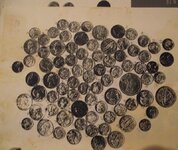Hi CP - your Finders Keeper program looks pretty interesting and well done! In my opinion, $4.99 is easily a fair fee for a well done database style program designed to cater to the needs of a detectorist - I truly believe that someone who was interested would consider that a bargain.
Unfortunately, I think you’re right that there’s a general lack of interest in detecting specific software in the community. I think that for many, the idea of logging their finds or any other such “data entry” starts to look too much like time consuming work, spoiling what is supposed to be a leisurely activity.
I know this is partially true for me. I love the idea of keeping track of all my finds - so much so that I tried several different commercial or third-party logging methods, including a detecting specific database program called iDetect. That program was very well put together, but I rapidly found that entering the details and finds for each hunt took a ton of time - it became a chore and I quickly fell behind on entries. My job requires that I keep a detailed log of my activities, so of course that added to the feeling that I had made a leisure activity into something that mimicked an unpleasant work task. The same issue ultimately doomed other apps and programs I’ve tried.
The other worry with a program is obsolescence and/or future compatibility. In the case of iDetect, the program was aging and technically obsolete when I found it online and started using it. If I remember right, the upgrade to Windows 11 made the program essentially unusable, and I was fortunate that I had used it for a very limited number of entries so it was relatively easy to manually move most of the data to a new format. I would hate to have years worth of detecting finds and locations diligently recorded, only to have the program go unsupported and then potentially go inaccessible because of operating system changes.
The solution that’s worked for me over the past 3 years has been a simple Excel spreadsheet of my own design which is set up to help me record the particulars of the hunt that are important to me without feeling like I’m drowning in detail. It condenses things down to a good compromise for me - I can log a full day’s hunt in under 10 or 15 minutes, but still go back a couple years later and remember exactly what was found and where. Most importantly, I’ve tailored and changed the spreadsheet to suit my needs over the years. So, yes, there would definitely be competition from free or self-made options.
Best of luck if you choose to tackle the rewrite for Finders Keeper - despite my own caveats that I listed, I have no doubt there are more than a few detectorists that would find the program very useful. Maybe if you can find a good way to provide customization to save data entry time for individual users and add a way to ensure basic future-proofing (exportable csv file structure?) you might inspire interest from more potential users. For $5, I would gladly give it a try!




 mine was a commodore 64 at that time
mine was a commodore 64 at that time